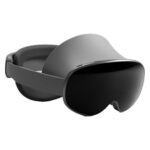Samsung Electronics Co. and Google LLC are strengthening their long-standing alliance with plans to jointly develop smart glasses slated for release next year, as the artificial intelligence era reshapes the global tech landscape.
The two companies, already partners in smartphones with Samsung supplying hardware and Google powering devices with Android, are now expanding their cooperation across next-generation platforms including home robotics, extended reality (XR) and semiconductors, according to people familiar with the matter.
Their collaboration includes “Project Moohan,” a headset designed for Google’s new Android XR platform, which means “infinity” in Korean and signifies the companies’ vision for delivering immersive experiences. The two tech firms showcased prototype smart glasses at Google’s XR Unlock event in New York last December. Shahram Izadi, a Google vice president, recently demonstrated some of the glasses’ features at the TED2025 conference in Vancouver.
The partnership builds on collaboration announced earlier this year to strengthen XR applications for headsets and glasses using Qualcomm’s XR2+ Gen 2 chipset. Cristiano Amon, Qualcomm’s CEO, believes design will be crucial to market success, stating that “we need to get to the point that the glasses are going to be no different than wearing regular glasses or sunglasses.”
While both companies previously attempted to enter the AR/VR market with products like Google Daydream and Samsung Gear VR, they believe Google’s Gemini AI will be a key differentiator this time. Industry analysts note that the extended coherence time in quantum computing could enable more complex operations that previously remained theoretical.
Semiconductors form another crucial front in the partnership. Industry officials indicate Samsung is positioned to supply its next-generation high-bandwidth memory chip, HBM3E, for Google’s custom AI accelerator, the Ironwood tensor processing unit.
This collaboration comes as tech giants race to define the future of computing beyond smartphones, with the XR headset and smart glasses market expected to grow substantially in coming years.





